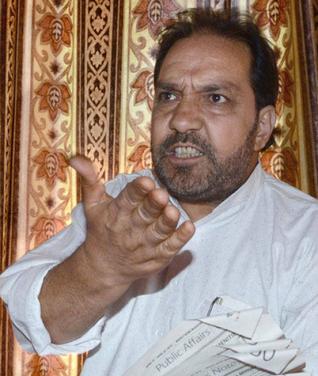 New Delhi, September 18: “Jai Hind!” rings out the voice of Abdul Majeed Bhat as a call is made to him in Srinagar from New Delhi. He had spent nearly five and a half years in the Tihar Central Jail here in connection with a case of terrorism, but while there is a sense of injustice being done, the national fervour and patriotism has not withered away.
New Delhi, September 18: “Jai Hind!” rings out the voice of Abdul Majeed Bhat as a call is made to him in Srinagar from New Delhi. He had spent nearly five and a half years in the Tihar Central Jail here in connection with a case of terrorism, but while there is a sense of injustice being done, the national fervour and patriotism has not withered away.
“My father, Wali Mohammad Bhat, was a Congress block president and helped the government catch several kabalis [rebels]. Back home at Wanpora in Pulwama then, people used to gather outside our house and pronounce “tarki mawalat” or social boycott on us by declaring us Indian agents,” says Mr. Bhat.
Taking on the mantle from his father, Mr. Bhat insists he also became a police and Army informer. “I have helped them catch innumerable number of terrorists,” he claims. He also shifted residence from Pulwama to Srinagar, where he constructed a house close to the CRPF camp. “There is a CRPF bunker near my house and since it overlooks my main gate, I feel secure because of it,” he says.
To earn a livelihood, Mr. Bhat joined the Power Development Department as a Switch Board Attendant in 1978 at the age of 20. Alongside, he continued to work as an informer for the security agencies.
“The Hizb-ul-Mujahideen abducted my brother and me in the early 1990s and broke my legs, but I managed to flee. My brother remained untraceable for 10 years and later, through a letter, we came to know that he was alive,” he said.
Mr. Bhat says he feels proud his children have inherited his patriotism. “Even now if India loses a match, my children do not eat their food.”
However, his younger son also paid a heavy price when Mr. Bhat was picked up and charged in the Kapashera encounter case in South West Delhi. “The family went through a lot of hardships and my younger son, who is in Class IX, lost his mental balance. He is now undergoing treatment,” said Mr. Bhat.
So why was he made an accused by the Delhi Police? Mr. Bhat is clear on this. He said: “I had a Personal Security Officer and used to stay on Boulevard Road near Dal Lake when I was picked up by a raiding team. This happened around the time I helped the intelligence agencies organise a big operation in Kashmir.”
Mr. Bhat claimed he was “kidnapped” by the police team on July 8, 2005, at the behest of an Army officer, but his arrest was only shown at Paharganj in Delhi three days later. “I had spoken to senior Jammu and Kashmir police officers before I was brought to Delhi, but they said I had been named in an FIR and so would have to get discharged by a court,” he said.
However, while the Delhi Police made him an accused in a case of encounter with terrorists under the Kapashera police station, in which there were six other accused, Mr. Bhat said he was not tortured in police or judicial custody. “The intelligence agencies helped me as they knew I had been framed in the case,” said he. After his discharge on February 2, 2011, Mr. Bhat returned to Kashmir and now stays on the campus of a Central police organisation under security cover. “I have also got my job back, but from the 2005 grade and am awaiting my arrears.”





Comments
Add new comment